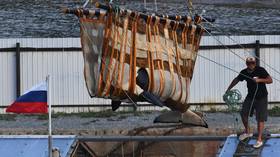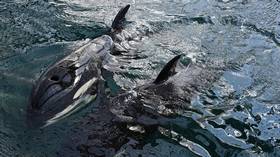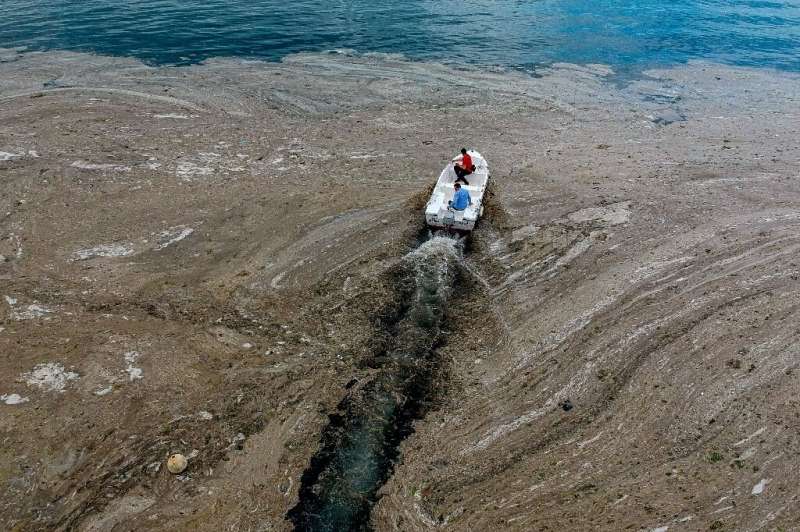Andrew MARSZAL
Fri, 10 December 2021


Ariana DeBose (L) portrays Anita in Steven Spielberg's 2021 remake of "West Side Story," a role that Rita Moreno (R) played to acclaim half a century earlier (AFP/Charley Gallay)More
It is every aspiring actor's dream: hand-picked by Steven Spielberg from 30,000 contenders for a starring role that launches her into Hollywood's A-list and Oscars contention.
But Rachel Zegler insists the process of her casting as Maria in the new film adaptation of "West Side Story," which hit US theaters on Friday, was anything but straightforward.
"It didn't feel like a fairy tale when it was happening. I was actually very stressed out!" Zegler, who was 16 when she submitted a video of herself singing "I Feel Pretty," told AFP.
Zegler, a New Jersey native, went through "eight or nine" rounds of auditions over nearly a year.
"I left every single round thinking if I don't get it, I can't wait to see this movie, and I've had today and I've met these cool people, and maybe they'll keep me in mind for the next thing.
"I had the greatest time -- and then I got to actually make the movie," Zegler added.
Due to pandemic delays, the Spielberg motion picture was kept under wraps for more than two years after filming finished, during which time she has been cast as Snow White in Disney's upcoming live-action remake.
Zegler, now 20, is being tipped as a contender for best actress at the Oscars held in March, with the film's campaign blitz launching her into the public eye.
"It's the most jarring, overwhelming experience," said Zegler, adding that "she doesn't know how to feel" about becoming a celebrity.
"Being known is fun, being known is cool too," she said.
- 'We're different' -
Spielberg's decision to remake a beloved 1961 film which won 10 Oscars -- the most ever for a musical -- drew criticism from many fans who felt it could not be improved upon.
Reviews have been glowing, however, with Zegler and Ariana DeBose -- who plays the fiery Anita -- drawing particular praise.
Additional controversy came from the 1950s Broadway musical's stereotyping of Puerto Rican immigrants as gang members, and its use of racial slurs.
But while the original film version was criticized for casting a white actress as Maria, and painting Rita Moreno's skin darker to play Anita, Spielberg cast his movie more authentically.
DeBose, who is Afro-Latina, said her real-life heritage helped her performance stand out from the legendary Moreno, who joined her on set for Spielberg's film as a new character.
"It wasn't intimidating because we're different. I mean, sure, she's 100 percent an icon, she's beloved," she told AFP.
"But by virtue of me being Afro-Latina, we are inherently different women, with different lived experiences and my lived experience informs this character fully," said DeBose.
"I walk through the world in a very different way. So I feel like when you know that you have something to offer a character you hold fast to that. And you don't focus on the pressures of someone else's legacy."
Moreno, one of the elite club of entertainers to have won an Emmy, Grammy, Oscar and Tony award -- popularly known as an "EGOT" -- "showed us that there was possibility of success," said DeBose.
"For my character specifically, now young Afro-Latinas finally get to see themselves as a main character in the context of this story."
Zegler, who is of Colombian heritage, added: "As a Latina, I could not be more proud to be a part of a project that represents our people in such a beautiful way, and represents real-life experiences that we've all had, and that our ancestors had when they came here for the first time."
amz/hg/crs/mlm
Fri., December 10, 2021

David Alvarez portrays Bernardo Vasquez. The Cuban-Canadian actor says there is 'so much pride' in the new adaptation of the 1961 classic. (20th Century Studios/AP - image credit)
When Rita Moreno starred as Anita in West Side Story, the 1961 movie in which half of the characters are Puerto Rican, she was the only Latino performer among the cast.
Still, she — and her white colleagues — were made to wear makeup that darkened their skin.
It was a common practice back then. But in the 60 years since, Moreno says Latino representation in film and television "hasn't changed anywhere near enough."
"In some respects it has gotten better," she told CBC News. "In some respects, it's pretty much the same … I think we're represented so poorly in films and television."
Director Steven Spielberg says he wanted to cast his version, in theatres now, more "authentically" — to make sure the actors playing the famed musical's Puerto Rican teens "were 100 per cent Latinx and young."
Like the original, his version is based on the 1957 stage musical by Stephen Sondheim and Leonard Bernstein, recounting the forbidden romance of Tony, an American boy, and Maria, a Puerto Rican girl, in 1950s New York City. Their affair is complicated by allegiances to rival teenage gangs: the Puerto Rican "Sharks" and the white American "Jets."
Moreno, now 89, takes on a new role as Valentina, a scene-stealing shopkeeper.
One expert says that Latino performers have been overlooked and stereotyped by Hollywood for years. The old West Side Story was no exception.
It "looks really weird to us today because we see that, and [we think], 'What is that?' and, 'Why does [Moreno] have so much makeup?'" said Charles Ramírez Berg, a professor of film studies at the University of Texas at Austin and an expert on Latinos in American cinema.
"Back in 1961, that was just the convention and that was just how movies were made."
A new generation of Latino triple threats — all actors, dancers and singers — emerge in Spielberg's adaptation. One is Canada's David Alvarez, who plays Shark leader Bernardo, a role originally portrayed by Greek actor George Chakiris.
Alvarez, who is of Cuban descent, says while he loves the original, it's not without its shortcomings.
"The only thing that I wish had been the case is that the old movie represented the Latin community a little better," Alvarez said. That's why there is "so much pride" behind this new film, he added.
"My parents struggled so much to try and give me a better life," said Alvarez, whose parents moved from Cuba to Canada during the 1990s.
"It makes me so happy that not only my parents get to see it, but just a whole entire community who understand the struggle that Bernardo, Anita and Maria go through."
Another change: Spielberg's West Side Story forgoes subtitles when characters are speaking Spanish.
"I felt that subtitling the Spanish would have been disrespectful to the second language in this country, and that it would immediately make English the dominant language," Spielberg said in an interview with Digital Spy, a British entertainment website.

"It was out of complete respect, and to give the dignity where dignity is earned and deserved to be given."
Alvarez says understanding Spanish-language scenes is a matter of context, not linguistics.
"All you've got to do is look at how it's being said. How am I saying it? Am I kissing Anita when I'm saying it? If I'm kissing Anita … maybe I'm saying something flirty."
Audiences have increasingly pushed back against film and television that, when casting within a particular ethnicity, favour light-skinned performers, shutting darker-skinned talent out of roles.
By contrast, 2021's West Side Story has been lauded for casting Afro-Latino performers, including breakout star Ariana DeBose, who portrays Anita — the same character Moreno was made to darken her skin for in 1961.
Ethnic representation on the screen is never perfect, says Ramírez Berg. But these days "it's much better."
"People are thinking and kind of expanding their cinematic view of stories that can be told, of characters that can hold our attention for a film, and actors who could play those characters."

Niko Tavernise/20th Century Studios/AP












